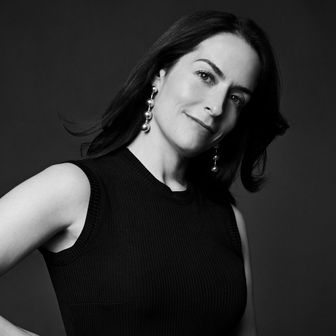
Recently, the Cut published a personal essay by a man who found that opening his marriage had sparked a new sense of feminist awareness. “Feminism always comes back to sex, even when we’re talking about everything else,” wrote Michael Sonmore. “The point is that it should be women who choose, not men — even the men they’re married to.”
We knew people might disagree with the ideas in the essay, but we were unprepared for the avalanche of responses the piece received. “Cuckolded New York Magazine Writer Thinks He Discovered the Meaning of Feminism,” blared Rush Limbaugh. Men’s-rights activists pounced, calling the writer deluded and emasculated. “Do you need further proof that modern feminism is nothing but some disgusting freakshow to give in to self indulgement [sic]?” read one representative comment of the more than 1,000 posted on the piece.
We decided to check back in with the author — and this time, we wanted to hear from his wife, too. We wanted to know what kinds of conversations they’d had since the article ran — had they read the comments? How did they feel about the anger their story had generated?
They generously agreed to continue the conversation.
Why do you guys think this story hit such a nerve for people?
Michael: All I can say is I think the old models are breaking down and have not yet been replaced by new models. There are a lot of desires, there’s a lot of behavior out there in our culture today that doesn’t yet have a model or a name. The response to the article demonstrates the fear that people have when they’re confronted with something new and they don’t yet have words to describe it and a place to put it. And they also demonstrate, even from that fear, how much people want to cling to the old model even though those old models are not even relevant anymore. There’s a lot of people in our culture asking, “What does family mean? What does marriage look like?”
Lilly: I was surprised by the vitriol of the responses, maybe especially so from women more than the men. When the article first published, I read a handful of the comments. One of them contained this notion like, “this is why you should have a lot of sex before you get married,” and I was like, “Okay, so these people are all morons. ‘Oh, you should drink a lot of water before you go to the desert so then you won’t be thirsty anymore.’”
It wasn’t just the fact that you opened up your marriage that made people so mad, a lot of the commenters were these deeply offended men complaining that you were a stay-at-home dad, theorizing that’s why she didn’t want to have sex with you. They were so loaded with gender assumptions and deeply felt stereotypes about how traditional male-female parenting and marriage should work.
Michael: The world needs to be less masculine, more caring, more nurturing and all those things that have been assigned to women as their sole purview. When you mentioned that the men’s-rights movement picked up on it, I rolled my eyes. That such a thing exists is proof of everything I’m saying. Men’s-rights movement? What is that, even?
Lilly: It kind of reminds me of that joke on Mother’s Day when the kids go, “When’s Kid’s Day?” And the moms all say, “Every day is Kid’s Day!”
What will you tell your kids about marriage?
Lilly: Nothing in a tawdry way, broad strokes are fine. The concept of consensual non-monogamy is fine. I’m obviously careful, the same way I wouldn’t talk to them about any other sort of topic that was too advanced for their age. I don’t think kids have any idea about what their parents are doing regardless.
Michael: Yeah, that’s the other thing, to the extent that children are ever interested in their parents’ sex lives, it might not be as big of a conversation as people think.
Lilly, did you see open marriage as a feminist issue or did you just see it as more of a personal issue?
Lilly: I sort of consider myself a feminist, but I didn’t approach this endeavor under the banner of feminism. It was more that as I got older and looked at how my thoughts and opinions about many things hold up to scrutiny, a lot of them didn’t, in particular my strong opinions about sex, and its inherent meaning or value. You’re led to believe many things about sex, through media or school — being a young woman in the ‘90s — you have all of this cultural baggage that seeps into your mind. Unless you actually take the time to look at why it’s there, it can sort of just stay that way forever.
Do your friends or family know about your arrangement?
Michael: Everybody knows about it except my parents. I have found most people to be overwhelmingly supportive of us. They were obviously a little shocked at first. They’ve been curious and interested and supportive of us as individuals, as a couple, and as a family. I didn’t know how people would react, and to discover that my friends were as solid as I hoped they would be has been one of the best things about it.
Has it inspired anybody else you know to question or open up, or even just have conversations in their marriage?
Lilly: I know that happened on at least one occasion. I know somebody that I shared the draft of the essay with in advance of its publication, who then basically used that to start a conversation with her significant other, that I understand went very well.
Do you feel like you guys have advice to give people, or are you just sort of doing your thing?
Lilly: I mean, it’s not for everyone, so I wouldn’t want to proselytize. We are fairly new to this, but I’m happy to offer any sort of tips or advice or my own feelings about it.
Michael: I would agree. There are a lot of situations that we haven’t faced yet, there are a lot of things that could come up that haven’t come up. Right now, it’s still a very dynamic situation. The first time I re-read the essay was just earlier today, and I hadn’t looked at it since it went up. None of this was ever done out of fear. And, you know, now we’re at a place where it’s like every day we volunteer anew — I’m still here, you’re still here? Okay, good. By granting each other that individuality, I’m confident that I’ll be able to look back when I die and say, “Hey, I did have a life-long partner and because I respected her as a partner and I didn’t have to shackle her with the title to make her do certain things and I didn’t have to give her a name in order to put her in a box to assure that she would fulfill certain roles and produce certain results.” Every day I’m confronting my wife’s whole person, and she’s doing the same to me, and in that way, that’s why I think it’s getting better all the time.
Lilly, how does it make you feel to hear that?
Lilly: He’s an incredible person, which is why I want to be married to him. I’m more impressed with him each day.
This interview has been condensed and edited.


